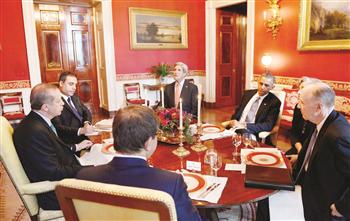Opposition leaders have voiced their concern over the possible outcomes of a lengthy working dinner between the leaders of Turkey and the United States, as the government has been persistently tightlipped over the content of the dinner that took place at the White House on May 16.
 Subject to stinging criticism by both the main opposition Republican People’s Party (CHP) leader Kemal Kılıçdaroğlu and Nationalist Movement Party (MHP) leader Devlet Bahçeli, the meeting in the Red Room of the White House was part of an official meeting between Prime Minister Recep Tayyip Erdoğan and U.S. President Barack Obama.
Subject to stinging criticism by both the main opposition Republican People’s Party (CHP) leader Kemal Kılıçdaroğlu and Nationalist Movement Party (MHP) leader Devlet Bahçeli, the meeting in the Red Room of the White House was part of an official meeting between Prime Minister Recep Tayyip Erdoğan and U.S. President Barack Obama.
The “3+3” dinner, as dubbed by the Turkish media, saw the participation of Turkey’s intelligence chief Hakan Fidan and Obama’s National Security Advisor Thomas Donilon, along with U.S. Secretary of State John Kerry and his counterpart Ahmet Davutoğlu.
Upon his arrival in Istanbul on May 21, Erdoğan briefly touched upon the meeting, describing it as a meeting with “limited participation.” The sensitivities in the region and responsibilities falling on shoulders of Turkey and the U.S. were the issues reviewed, he said of the meeting, during which Syria was probably top of the agenda. Earlier in the day in Ankara, the CHP leader called the same meeting “a special meeting.”
‘No info for archives’
“They had a special meeting there. A shameful event for Turkey took place. There was no foreign [ministry] undersecretary, no ambassador … Which information will enter the state’s archive? This is the understanding that sees the country as their own property,” Kılıçdaroğlu said, referring to the meeting in the Red Room.
For his part, Bahçeli stressed “it is still not clear not clear what was discussed and shared, and which promises were exchanged in the Red Room.”
“Here, to represent Turkey alongside Prime Minister Erdoğan, the foreign minister and the undersecretary of the National Intelligence Service [MİT] attended the meeting; from the U.S. side, President Obama was accompanied by his foreign minister and national security advisor. Another detail that caught attention was that the undersecretary of the CIA did not attend the meeting and he was in Israel at the time,” he said.
“In addition to enlightening this sidelined issue, what was discussed in the Red Room is very important. Was the bloody cost of the BMENA [the Broader Middle East and North Africa Initiative] on the table in the Red Room? Were these conversations recorded in the proceedings? Were the necessary precautions taken to be recorded in state archives? Was the Turkish state tradition complied with? Were the particularities and rules of diplomacy obeyed? What did Prime Minister Erdoğan tell Obama in reality, what did he promise and what concessions did he give? What did Obama dictate to the prime minister, what did he command and what new orders did he line up? Did Prime Minister Erdoğan make promises without considering national interests – promises that Turkish people cannot endure?” he said, listing his questions.
“For us, the main idea, the real agenda, and the summary of the U.S. visit is hidden in what was discussed in the Red Room. If that part is clarified, the facts will come out one by one, it will be clear who is standing where and what motives they have,” Bahçeli added.The main opposition CHP and the MHP question the content of a dinner attended by US President Obama and Turkish PM Erdoğan as well as Turkish and US intelligence representatives.













